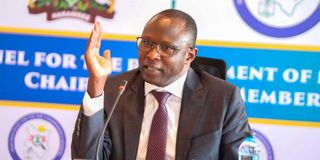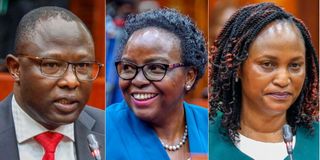
IEBC chairperson Erastus Edung Ethekon.
The High Court is set to rule on the fate of President William Ruto’s choice of seven electoral agency commissioners, a verdict that has far-reaching implications including the country’s preparedness for the 2027 General Election.
The court's decision will determine whether the process of their appointment, currently on hold, may proceed to the final stage of taking oath of office or fresh recruitment would be undertaken.
The verdict is scheduled to be delivered on Tuesday, July 8, 2025 at 11.00am at the High Court in Milimani, Nairobi.
Having followed the proceedings from the point of filing of the petition on May 15, 2025 and hearing sessions, the Nation outlines six key questions identified by the parties and which will either save or sink the new Independent Electoral and Boundaries Commission (IECB) bosses.
They are Erastus Edung Ethekon (proposed chairperson), Hassan Noor Hassan, Mary Karen Sorobit, Anne Nderitu, Moses Mukwana, Francis Odhiambo and Fahima Araphat Abdallah.
Among the key questions emerging from the petition filed by Mr Kevin Roy Omondi and Boniface Mwangi is whether the President observed the regional balance rule in choosing the nominees.
A three-judge bench comprising justices Justice Roslyne Aburili, John Chigiti and Bahati Mwamuye is expected to determine whether it was mandatory for the President to ensure regional balance, ethnic balance and the inclusion for persons with disabilities in the Commission.
According to the petitioners, the nominations failed this constitutional test because two of the nominees, Erastus Ethekeon and Mary Karen Sorobit, are from the same region of Rift Valley while the Upper and Lower Eastern region lacked representation.
“The nomination of the Chairperson and Commissioner from Rift Valley is contrary to the Constitution of Kenya, 2010. The Constitution did not anticipate that the composition of the Independent Electoral and Boundaries Commission (IEBC) would be dominated by a majority of persons from the same region while excluding other regions of the Republic of Kenya such as the entire Upper Eastern and Lower Eastern Regions,” argued the petitioners.

Independent Electoral and Boundaries Commission (IEBC) nominees (from left) Erastus Edung Ethekon, Mary Karen Sorobit and Ann Njeri Nderitu.
But the appointees refuted these allegations as well as exclusion of people living with disability. They stated that they come from diverse ethnic and regional backgrounds, and the Selection Panel followed due diligence.
The second question is whether the President was obligated to consult the Opposition party in the reconstitution of the IEBC.
It was the petitioners’ case that under that National Dialogue Committee (Nadco) report the selection of nominees by the President ought to have been preceded by a consultation between him and the Opposition.
“The President did not engage or consult the Minority/Majority Political Parties at the National Assembly prior to making the selection as per the National Dialogue Committee recommendations adopted by the National Assembly,” they told court.
Third is whether nominees Mary Karen Sorobit and Hassan Noor Hassan were eligible to be short-listed by the Selection Panel having held a leadership position at Jubilee Party and vied for a political seat, respectively, in the last five years preceding their nomination.
It is alleged that Ms Sorobit was ineligible as she was the Executive Director and member of the governing body of the Jubilee political Party in the last five years preceding her selection and nomination.
The petitioners say Ms Sorobit served as a county chairperson of the Jubilee before the 2022 elections and her short-listing contravened the express provisions of Article 88(2)(a) of the Constitution.
For Mr Noor, it is alleged that he was ineligible to apply or be selected as an IEBC commissioner as he vied for Mandera county governorship in 2022.
Article 88(2) of the Constitution provides that “A person is not eligible for appointment as a member of the Commission if the person has, at any time within the preceding five years, held office, or stood for election as a member of Parliament or of a County assembly; or member of the governing body of a political party”.
The fourth question touches on the perception of bias stemming from the personal relationships between some nominees and powerful politicians.
Of main interest is the proposed chairperson Erastus Ethekon's relationship with State House Deputy Chief of Staff Josphat Nanok.
Court papers show that Mr Ethekon served as Turkana County Attorney when Mr Nanok was the governor, “hence the nomination is tainted with fears he may not be impartial and may lack the neutrality required of a chairperson of IEBC”.
The court is expected to determine whether the alleged relationship meets the threshold of "real danger of bias" test and a perceived bias.
During the hearing, Mr Etheken responded that “The allegations of political affiliation with the State House Deputy Chief of Staff Josphat Nanok are tenuous at best”.
He asked the petitioners to look at his competence and qualifications. His legal team described him as an eminently qualified person, citing over 20 years of legal experience.

IEBC nominees Hassan Noor Hassan, Erastus Edung Ethekon (chairperson), Anne Nderitu and Mary Karen Sorobit.
The fifth question is whether it was unlawful for the President, and the Selection Panel chaired by Nelson Makanda to fail to publicize the information relating to the performance of the candidates and the report on the interviews?
The petitioners were aggrieved that President Ruto failed to disclose to Kenyans the reasons for his choice of the seven persons.
They say the President should have informed Kenyans why he chose Mr Ethekon to be IEBC chairperson over Mr Edward Katama Ngeywa, a 49-year-old from Trans-Nzoia County living with disability whom the Selection Panel proposed for the chairperson position alongside Mr Ethekon.
"The Selection Panel’s report and outcome of the interviews constituted important information to be shared with the public. It was unconstitutional for the President and the Selection Panel to fail to publicize the information relating to the performance of the candidates and the report on the interviews. The petitioners requested for the information pertaining to the interviews but their request was ignored," argued the petitioners' counsel Paul Muite.
The sixth key issue is whether it was illegal for the Selection Panel to add Mr Hassan Noor to the list of shortlisted candidates through an addendum.
The court is expected to determine whether this was irregular and if so, whether it compromised the recruitment process.
“Mr Hassan Noor Hassan was never shortlisted for the interviews and was only sneaked in through an addendum contrary to the selection and nomination process under the Independent Electoral and Boundaries Commission Act,” said the petitioners.







